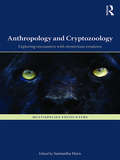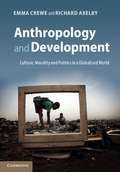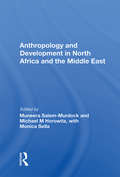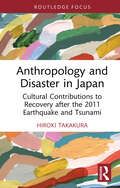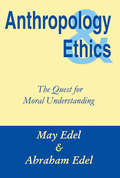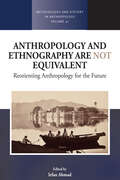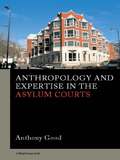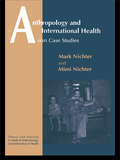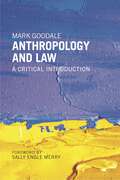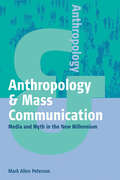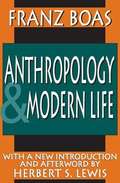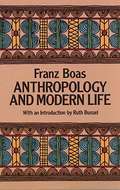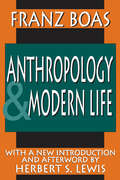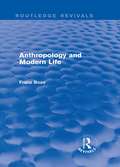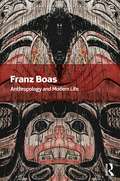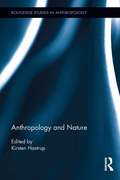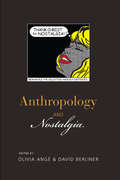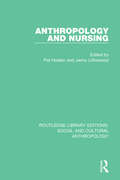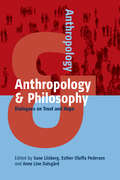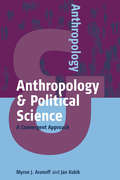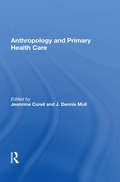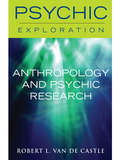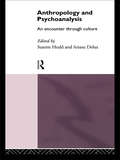- Table View
- List View
Anthropology and Cryptozoology: Exploring Encounters with Mysterious Creatures (Multispecies Encounters)
by Samantha HurnCryptozoology is best understood as the study of animals which, in the eyes of Western science, are extinct, unclassified or unrecognised. In consequence, and in part because of its selective methods and lack of epistemological rigour, cryptozoology is often dismissed as a pseudo-science. However, there is a growing recognition that social science can benefit from engaging with it, for as as social scientists are very well aware, ’scientific’ categorisation and explanation represents just one of a myriad of systems used by humans to enable them to classify and make sense of the world around them. In many cultural contexts, myth, folk classification and lived experience challenge the ’truth’ expounded by scientists. With a reflexive, anthropological approach and drawing on rich empirical and ethnographic studies from around the world, this volume engages with the theoretical and methodological issues raised by reported sightings of unrecognised animals. Bringing into sharp focus the anthropological value and challenges for methodology posed by beliefs about unclassified creatures, Anthropology and Cryptozoology: Exploring encounters with mysterious creatures will be of interest to anthropologists, sociologists and geographers working in the fields of research methods, anthrozoology, mythology and folklore and human-animal interaction.
Anthropology and Development
by Richard Axelby Emma CreweIn recent decades international development has grown into a world-shaping industry. But how do aid agencies work and what do they achieve? How does aid appear to the adults and children who receive it? And why has there been so little improvement in the position of the poor? Viewing aid and development from anthropological perspectives gives illuminating answers to questions such as these. This essential textbook reveals anthropologists' often surprising findings and details ethnographic case studies on the cultures of development. The authors use a fertile literature to examine the socio-political organisation of aid communities, agencies and networks, as well as the judgements they make about each other. The everyday practice of development work is about negotiating power and culture, but in vastly different ways in different contexts and for different social groups. Exploring the spaces between policy and practice, success and failure, the future and the past, this book provides a rounded understanding of development work that suggests new moral and political possibilities for an increasingly globalised world.
Anthropology And Development In North Africa And The Middle East
by Muneera Salem-Murdock Michael M Horowitz Monica SellaThis book documents the function of social science analyses in the identification and evaluation of development programs in the Middle Eastern and North African countries. It demonstrates that anthropology and social sciences have a good deal to contribute to the understanding of domestic economies.
Anthropology and Disaster in Japan: Cultural Contributions to Recovery after the 2011 Earthquake and Tsunami (Routledge Focus on Anthropology)
by Hiroki TakakuraThis book focuses on the 3.11 disaster in Japan, involving a powerful earthquake and tsunami, from an anthropological perspective. It critically reflects on the challenges of conducting anthropological research when encountering disaster at home and the position of social scientist as sufferer. Emphasizing the role of culture in disaster mitigation, the book offers theoretical consideration of the role of cultural heritage in risk management, in line with recent trends in international policy on disaster risk reduction. Taking an approach “with the people in,” the author explores how culture features in disaster recovery at community level and considers implications for policy. The chapters explore the response and adaptation by local cultural practitioners and performing arts groups as well as farmers and fishers. Japanese farming and fishing are presented as an innovative and dynamic part of the recovery process. The book will be of interest to scholars and policymakers working in disaster studies, Japan studies, and fields including anthropology, geography, sociology, and heritage management.
Anthropology and Economy (New Departures in Anthropology)
by Stephen GudemanComparative and critical, Anthropology and Economy offers a uniquely cross-cultural view of economy. Using examples from market and non-market situations, the book shows how economies are built on five increasingly abstract spheres, from the house to community, commerce, finance, and meta-finance. Across these spheres, economy incorporates a tension between self-interested rationality and the mutuality of social relationships. Even when rational processes predominate, as in markets, economies rely on sociability and ritual to operate, whether as cronyism, pleas to divinities or the magical persuasions of advertising. Drawing on data and concepts from anthropology and economics, the book addresses wealth inequality, resource depletion, and environmental devastation especially in capitalism, providing an understanding of their persistence and ideas for controlling them. Given the recent financial crash, Gudeman offers a different understanding of the crisis and suggestions for achieving greater economic stability.
Anthropology and Ethics: American Lecture Series, No. 353
by Abraham EdelThis book presents the results of an experiment in interdisciplinary collaboration to clarify theories of morality and anthropology and philosophy, showing how each may be enriched by borrowing from the other. Pooling the resources and methods of their respective fields-anthropology and philosophy-May and Abraham Edel examine the wide range of moral differences in the world -to establish 'coordinates' for the more systematic mapping of particular moralities, to explore more explicitly the relations of morality to cultural patterns and social processes, and to see how philosophic issues of ethical theory become refined and reformulated when their cultural content is made manifest.- The book contains an implicit suggestion that the anthropologist should focus on morality as an independent area of study and that the philosopher should stop treating morality in isolation. Anthropology tends to include morality as an incidental part of other inquiries. Philosophy, on the other hand, tends to cut morality off from the framework of psychological and cultural processes; the result is a kind of deadlock in ethical theory. The Edels observe that to develop a working concept of morality at least as well developed as that furnished for religion, anthropology can benefit from philosophic methods of analyzing concepts and from philosophical ways of conceptualizing problems of ethical theory. On the other hand, philosophy can use the methods of anthropology, to approach morality in more meaningful terms. This study is not addressed only to professionals; its aim, rather, is to -provide an orientation to morality itself in a world in which human problems are becoming extremely complex and have to be confronted directly as moral.-
Anthropology and Ethnography are Not Equivalent: Reorienting Anthropology for the Future (Methodology & History in Anthropology #41)
by Irfan AhmadIn recent years, crucial questions have been raised about anthropology as a discipline, such as whether ethnography is central to the subject, and how imagination, reality and truth are joined in anthropological enterprises. These interventions have impacted anthropologists and scholars at large. This volume contributes to the debate about the interrelationships between ethnography and anthropology and takes it to a new plane. Six anthropologists with field experience in Egypt, Greece, India, Laos, Mauritius, Thailand and Switzerland critically discuss these propositions in order to renew anthropology for the future. The volume concludes with an Afterword from Tim Ingold.
Anthropology and Ethnography are Not Equivalent: Reorienting Anthropology for the Future (Methodology & History in Anthropology #41)
by Irfan AhmadIn recent years, crucial questions have been raised about anthropology as a discipline, such as whether ethnography is central to the subject, and how imagination, reality and truth are joined in anthropological enterprises. These interventions have impacted anthropologists and scholars at large. This volume contributes to the debate about the interrelationships between ethnography and anthropology and takes it to a new plane. Six anthropologists with field experience in Egypt, Greece, India, Laos, Mauritius, Thailand and Switzerland critically discuss these propositions in order to renew anthropology for the future. The volume concludes with an Afterword from Tim Ingold.
Anthropology and Expertise in the Asylum Courts
by Anthony GoodAlthough asylum has generated unparalleled levels of public and political concern over the past decade, there has been astonishingly little field research on the topic. This is a study of the legal process of claiming asylum from an anthropological perspective, focusing on the role of expert evidence from 'country experts' such as anthropologists. It describes how such evidence is used in assessments of asylum claims by the Home Office and by adjudicators and tribunals hearing asylum appeals. It compares uses of social scientific and medical evidence in legal decision-making and analyzes, anthropologically, the legal uses of key concepts from the 1951 Refugee Convention, such as 'race', 'religion', and 'social group'. The evidence is drawn from field observation of more than 300 appeal hearings in London and Glasgow; from reported case law and from interviews with immigration adjudicators, tribunal chairs, barristers and solicitors, as well as expert witnesses.
Anthropology and International Health: South Asian Case Studies (Culture, Illness And Healing Ser. #15)
by Mark Nichter Mimi NichterRecognizing the significance of cultural aspects in the practice of medicine, this book places a strong emphasis on the social structure, customs, and history of the indigenous population and its ramifications on health care providers. The book also considers the econo-cultural influences on the way medicine is practiced. By including chapters that focus on health care's sudden advent as commodity and the microeconomic approach to public funding for health care facilities, the Nichters explore a world in which money and patients' expectations play an ever increasing role in the way health care is provided.
Anthropology and Law: A Critical Introduction
by Mark GoodaleAn introduction to the anthropology of law that explores the connections between law, politics, and technologyFrom legal responsibility for genocide to rectifying past injuries to indigenous people, the anthropology of law addresses some of the crucial ethical issues of our day. Over the past twenty-five years, anthropologists have studied how new forms of law have reshaped important questions of citizenship, biotechnology, and rights movements, among many others. Meanwhile, the rise of international law and transitional justice has posed new ethical and intellectual challenges to anthropologists. Anthropology and Law provides a comprehensive overview of the anthropology of law in the post-Cold War era. Mark Goodale introduces the central problems of the field and builds on the legacy of its intellectual history, while a foreword by Sally Engle Merry highlights the challenges of using the law to seek justice on an international scale. The book’s chapters cover a range of intersecting areas including language and law, history, regulation, indigenous rights, and gender. For a complete understanding of the consequential ways in which anthropologists have studied, interacted with, and critiqued, the ways and means of law, Anthropology and Law is required reading.
Anthropology and Mass Communication: Media and Myth in the New Millennium (Anthropology & ... #2)
by Mark Allen PetersonAnthropological interest in mass communication and media has exploded in the last two decades, engaging and challenging the work on the media in mass communications, cultural studies, sociology and other disciplines. This is the first book to offer a systematic overview of the themes, topics and methodologies in the emerging dialogue between anthropologists studying mass communication and media analysts turning to ethnography and cultural analysis. Drawing on dozens of semiotic, ethnographic and cross-cultural studies of mass media, it offers new insights into the analysis of media texts, offers models for the ethnographic study of media production and consumption, and suggests approaches for understanding media in the modern world system. Placing the anthropological study of mass media into historical and interdisciplinary perspectives, this book examines how work in cultural studies, sociology, mass communication and other disciplines has helped shape the re-emerging interest in media by anthropologists.
Anthropology and Modern Life
by Franz BoasAnthropologist Franz Boas challenges and reflects upon notions of race and culture in this critical work.
Anthropology and Modern Life
by Franz BoasThe great anthropologist's classic treatise on race and culture. Discusses biological and cultural inheritance, the fallacy of racial, cultural or ethnic superiority, the scientific basis for human individuality, and much more. One of the most influential books of the century, now in a value-priced edition. Introduction by Ruth Bunzel.
Anthropology and Modern Life
by Franz BoasAnthropologist Franz Boas was a stalwart fighter for human rights and against racism. He was passionately concerned about individual liberty, freedom of inquiry and speech, equality of opportunity, and the defeat of prejudice and chauvinism. His Anthropology and Modern Life shows how Boas uses science in the service of humanity, hoping to break down racial and cultural barriers.From the book's very opening, Boas shatters the myth that anthropology is simply a collection of curious facts about exotic peoples and their customs and belief systems. He asserts that a clear understanding of the principles of anthropology illuminates the social processes of our own times and may show us the book's what to do and what to avoid. Boas proceeds to discuss issues that have had resounding significance in our own time: the problem of defining race; the subjective view of racial types; heredity versus environment; alleged physiological and mental differences between races; the significance of intelligence tests; the importance of one's cultural experience; open versus closed societies; nationality and nationalism; the mixed descent of European nations; eugenics; social conditions versus heredity in the committing of crimes; intolerance; and the influence of race and sex on a successful education. While he outwardly acknowledges that his book runs contrary to popular prejudices, Boas was an optimist, and hoped that dissenters, in reading Anthropology and Modern Life, would come to reexamine their own viewpoints dispassionately and critically.This new edition of Anthropology and Modern Life is enhanced by an extended introduction by Herbert S. Lewis, who details Franz Boas' life, influence, and ideals. This volume will be a welcome contribution to the libraries of anthropologists, sociologists, and those concerned with human rights.
Anthropology and Modern Life (Routledge Revivals)
by Franz BoasAnthropology and Modern Life, first published in 1929, addresses itself to an immensely broad field with clarity, introducing anthropology as a unique and coherent discipline, and demonstrating its importance in the understanding of socio-cultural change throughout history. The author covers varied and diverse areas of study: ethnicity, including a lengthy discussion of the concepts of ‘race’ and ‘nationality’; criminology, and the importance of hereditary and environmental factors in producing criminals; education, and the associated issues of gender, class, and what would now be called ‘brainwashing’; and also the comparison between ‘modern’ and ‘primitive’ cultures, taking note of the development of socio-political institutions such as marriage and property.
Anthropology and Modern Life (Routledge Classics)
by Franz BoasFranz Boas (1858–1942) is widely regarded as the founder of American anthropology. He influenced an astonishing variety of scholars and researchers, from the anthropologists Margaret Mead and Ruth Benedict, to the philosopher W. E. B. DuBois, and novelist Zora Neale Hurston. Towards the end of his life he also lectured widely in an attempt to educate the public on the dangers of Nazi ideology. Anthropology and Modern Life demonstrates the incredibly rich and fertile range of Boas’s thought, engaging with controversies that resonate loudly today: the problem of race and racial types; heredity versus environment; the significance of intelligence tests; open versus closed societies; the ‘nature versus nurture debate’; and nationality and nationalism. Believing passionately that science should be used to break down racial and cultural barriers, from the book's very opening Boas shatters the myth that anthropology is simply a collection of ‘curious facts about exotic peoples’. Thanks to Boas's influence, anthropologists and other social scientists began to see that differences among the races resulted not from physiological factors, but from historical events and circumstances, and that race itself was a cultural construct. This Routledge Classics edition includes a new Foreword by Regna Darnell and an Introduction and Afterword by Herbert S. Lewis, who details Franz Boas's life, influence, and ideals. "In writing the present book I desired to show that some of the most firmly rooted opinions of our times appear from a wider point of view as prejudices, and that a knowledge of anthropology enables us to look with greater freedom at the problems confronting our civilization." - Franz Boas, Anthropology and Modern Life
Anthropology and Nature (Routledge Studies in Anthropology #14)
by Kirsten HastrupOn the basis of empirical studies, this book explores nature as an integral part of the social worlds conventionally studied by anthropologists. The book may be read as a form of scholarly "edgework," resisting institutional divisions and conceptual routines in the interest of exploring new modalities of anthropological knowledge making. The present interest in the natural world is partly a response to large-scale natural disasters and global climate change, and to a keen sense that nature matters matters to society at many levels, ranging from the microbiological and genetic framing of reproduction, over co-species development, to macro-ecological changes of weather and climate. Given that the human footprint is now conspicuous across the entire globe, in the oceans as well as in the atmosphere, it is difficult to claim that nature is what is given and permanent, while people and societies are ephemeral and simply derivative features. This implies that society matters to nature, and some natural scientists look towards the social sciences for an understanding of how people think and how societies work. The book thus opens up a space for new forms of reflection on how natures and societies are generated.
Anthropology and Nostalgia
by David Berliner Olivia AngéNostalgia is intimately connected to the history of the social sciences in general and anthropology in particular, though finely grained ethnographies of nostalgia and loss are still scarce. Today, anthropologists have realized that nostalgia constitutes a fascinating object of study for exploring contemporary issues of the formation of identity in politics and history. Contributors to this volume consider the fabric of nostalgia in the fields of heritage and tourism, exile and diasporas, postcolonialism and postsocialism, business and economic exchange, social, ecological and religious movements, and nation building. They contribute to a better understanding of how individuals and groups commemorate their pasts, and how nostalgia plays a role in the process of remembering.
Anthropology and Nursing (Routledge Library Editions: Social and Cultural Anthropology)
by Pat Holden Jenny LittlewoodNursing has been described as the most ‘natural’ female occupation of all, embodying the so-called feminine ideals of tenderness and caring. Yet these ideals are juxtaposed with images of nurses as sex objects, or as ruthlessly efficient harridans. How have these very different images been constructed? And how do they relate to the reality of nursing - the close contact with blood, urine and faeces, and the involvement with the rites of birth, illness and death? This book, first published in 1991, explores the alternative ways different societies have developed to reconcile these contradictions. Using contemporary, historical and cross-cultural case material, the contributors trace the historical development of the role, and investigate the expected qualities of nurses within different cultural settings, such as India, Uganda and Japan. They look closely at ‘the nurse’ as a social construct, and demonstrate how the stereotypes relate to a particular society's notions of gender. Designed primarily for anthropologists and sociologists interested in health, illness and systems of health care, this book challenges some of the myths of traditional nursing studies and provides an original perspective on doctor/nurse/patient relationships.
Anthropology and Philosophy: Dialogues on Trust and Hope (Anthropology & ... #4)
by Sune Liisberg Esther Oluffa Pedersen Anne Line DalsgårdThe present book is no ordinary anthology, but rather a workroom in which anthropologists and philosophers initiate a dialogue on trust and hope, two important topics for both fields of study. The book combines work between scholars from different universities in the U.S. and Denmark. Thus, besides bringing the two disciplines in dialogue, it also cuts across differences in national contexts and academic style. The interdisciplinary efforts of the contributors demonstrate how such a collaboration can result in new and challenging ways of thinking about trust and hope. Reading the dialogues may, therefore, also inspire others to work in the productive intersection between anthropology and philosophy.
Anthropology and Political Science
by Jan Kubik Myron J. AronoffWhat can anthropology and political science learn from each other? The authors argue that collaboration, particularly in the area of concepts and methodologies, is tremendously beneficial for both disciplines, though they also deal with some troubling aspects of the relationship. Focusing on the influence of anthropology on political science, the book examines the basic assumptions the practitioners of each discipline make about the nature of social and political reality, compares some of the key concepts each field employs, and provides an extensive review of the basic methods of research that "bridge" both disciplines: ethnography and case study. Through ethnography (participant observation), reliance on extended case studies, and the use of "anthropological" concepts and sensibilities, a greater understanding of some of the most challenging issues of the day can be gained. For example, political anthropology challenges the illusion of the "autonomy of the political" assumed by political science to characterize so-called modern societies. Several chapters include a cross-disciplinary analysis of key concepts and issues: political culture, political ritual, the politics of collective identity, democratization in divided societies, conflict resolution, civil society, and the politics of post-Communist transformations.
Anthropology And Primary Health Care
by Jeannine Coreil J. Dennis MullThis book covers the major theoretical perspectives, content areas, and methodologic approaches that presently characterize the field of anthropology and primary health care. It is of great value to physicians, epidemiologists, program managers, and other international health professionals.
Anthropology and Psychic Research
by Robert L. Van De CastleVery little cross-fertilization of ideas, concepts, or techniques has developed between the fields of anthropology and psychic research. This essay, chapter 11 of Psychic Exploration, reviews several firsthand reports of field observations that offer encouraging anecdotal support for the existence of psi. Also reviewed are the statistically-significant card testing experiments by Foster with American Indians, by the Roses with Australian aborigines, and by the author with Panamanian Indians. The full volume of Psychic Exploration can be purchased as an ebook or paperback version from all major online retailers and at cosimobooks.com.
Anthropology and Psychoanalysis: An Encounter Through Culture
by Suzette Heald Ariane DeluzIn Anthropology and Psychoanalysis the contributors, both practising anthropologists and psychoanalysts, explore in detail the interface between the two disciplines and locate this within the history of both anthropology and psychoanalysis. In particular, they deal with the distinctive reactions of British, French and American anthropology to psychoanalysis and the way in which the present fracturing of each of these national traditions and their post-modern turn has led to a new willingness to investigate the relationships between the disciplines and the role of the unconscious in cultural life. They also address important issues of methodology, and present a critical discussion of the concept of culture and the academic specialisation of knowledge. Anthropology and Psychoanalysis will be invaluable reading to all anthropologists and psychoanalysts.
